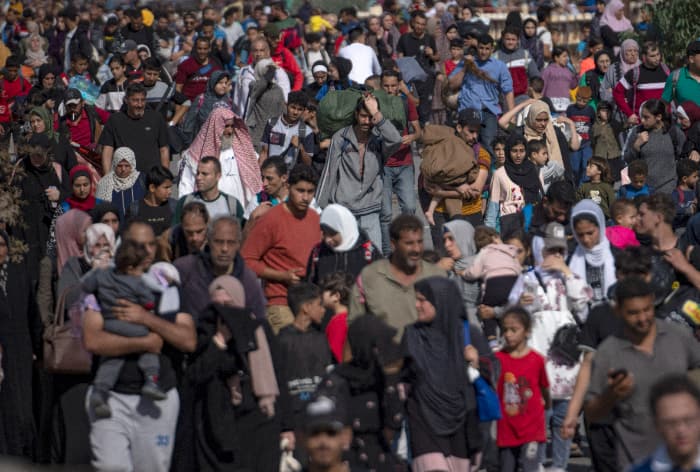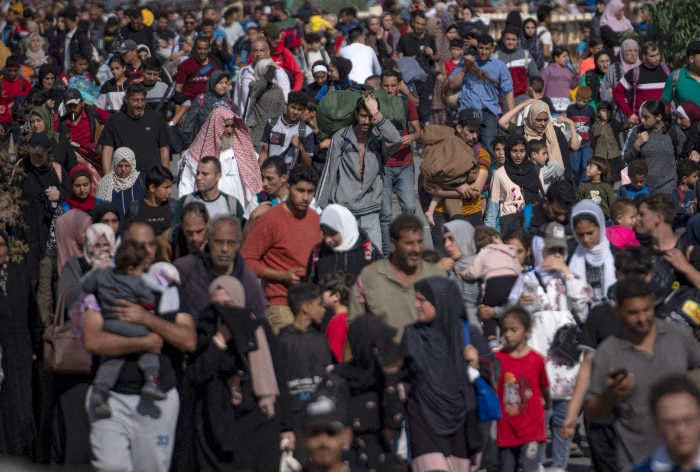Abu Sada described Shifa as a deathtrap for thousands of war-wounded, medical staff and displaced civilians sheltering there.

Jerusalem: The head of surgery at Gaza’s largest and most advanced hospital held up his phone Saturday to the hammering of gunfire and artillery shelling. “Listen,” said Dr. Marwan Abu Sada as fighting raged around Shifa Hospital.
Shells hissed through the hospital courtyard and crashed into wards while Israeli soldiers and Hamas militants locked in close quarters combat. Doctors tried to help patients even as they ran for cover.
Abu Sada described Shifa as a deathtrap for thousands of war-wounded, medical staff and displaced civilians sheltering there. The Israeli military denied it launched direct strikes or placed Shifa under siege.
In this Israel-Hamas war, hospitals in the main combat zone of northern Gaza have increasingly ended up in the crosshairs as Israeli tanks crunch through the hollowed-out heart of Gaza City. They have also become flashpoints for warring narratives.
Israel says Hamas militants are using hospitals as shields for fighters but hasn’t provided evidence of that, while Palestinians and rights groups accuse Israel of recklessly harming civilians seeking shelter.
The battles around Shifa on Saturday raised an urgent question: When do medical facilities lose special protection under international humanitarian law?
WHAT DOES ISRAEL SAY?
Israel claims that Hamas locates military assets under hospitals and other sensitive sites like schools and mosques. Bloodshed serves Hamas’ agenda, it says, winning international attention and sympathy for the Palestinian cause.
Israel has singled out Shifa, claiming Hamas operates its command headquarters beneath the hospital complex. The Israeli military has released an illustrated map of Shifa marked with claimed locations of the underground militant installations, without offering further evidence. Hamas, and Shifa Hospital Director Mohammed Abu Selmia, deny this.
Israel has said it will pursue Hamas fighters wherever they are, while trying to spare civilian lives.
“If we see Hamas terrorists firing from hospitals, we’ll do what we need to do,” Israeli army spokesperson Lt. Col. Richard Hecht said.
Last week Israel defended its bombing of an ambulance convoy evacuating wounded patients from Shifa, alleging that it was carrying Hamas fighters. That strike killed at least 12 bystanders, Abu Selmia said.
Asked about Saturday’s events at Shifa, the chief Israeli military spokesman, Rear Adm. Daniel Hagari, said the forces were not besieging Shifa Hospital but allowing a safe exit point on the hospital’s eastern side. He said the army was in touch with hospital officials and would help to move babies being treated there to a different hospital Sunday.
Israeli forces also battled Hamas militants in the rubble-filled streets outside Gaza’s Rantisi Hospital for Children, humanitarian officials reported. The Israeli army alleged it identified Hamas militants embedded among civilians in Rantisi when swarming the area last week. Some militants fled after the army opened an evacuation corridor for civilians, it said.
Rantisi Hospital shut down Friday after running out of fuel, said the World Health Organization, and it’s unclear how many people evacuated.
Amos Yadlin, former head of Israeli military intelligence, told Israel’s Channel 12 that the intensifying fight over Shifa and other hospitals creates moral and military dilemmas for commanders.
“Despite that we intend to deal with these hospitals,” he added. “Today it’s clear to all that they are the key command centers of Hamas.”
WHAT DO PALESTINIANS SAY?
Throughout the war, Palestinian families fleeing bombed-out homes have taken refuge in medical compounds, believing them to be safer than other alternatives.
Kamal Najar, a 35-year-old who sheltered at Shifa with his toddler son and infant daughter this week, said he believed that the hospital would be “off-limits, even for Israel.”
“It was the thing we somehow told ourselves wouldn’t happen,” he said, speaking by phone from the central city of Deir al-Balah, where he arrived by foot Friday after escaping what he said were strikes on the hospital with tens of thousands of others.
On Saturday, some 1,500 patients, along with 1,500 medical workers and some 15,000 displaced people were still stranded at Shifa, health authorities said. They said a blackout plunged Shifa Hospital into darkness and switched off life-saving equipment, killing several patients — including a newborn in an incubator.
Palestinian medical workers accuse Israel of mounting an all-out attack on infrastructure to punish the population and force a surrender. “It’s to say, ‘Not only will we kill and wound you, we will ensure you have nowhere to go to be treated,’” said Dr. Ghassan Abu Sitta, a British Palestinian surgeon working for Doctors Without Borders in Gaza City.
Some 190 medical workers were among more than 11,000 Palestinians killed since the start of the war, according to the Health Ministry in Gaza. Ongoing Israeli bombardment has wrecked 31 ambulances and knocked 20 hospitals out of operation, the ministry said. The war was triggered by Hamas’ brutal Oct. 7 attack on southern Israel in which about 1,200 people were killed.
“Death always feels close,” said Naseem Hassan, a 48-year-old medic in the southern city of Khan Younis. Too many colleagues, he said, have left the hospital only to return hours later in body bags. He had a close call Thursday when two missiles landed just meters from his ambulance.
“This is a war of all-out destruction and there is no protection anywhere,” he said. “Israel could be more precise but it’s choosing not to be.”
Israel has said it targets Hamas fighters, not civilians. However, it has used powerful explosives in strikes on densely populated areas that have killed large numbers of women and children.
WHAT DOES INTERNATIONAL HUMANITARIAN LAW SAY?
The claims and counterclaims over Gaza’s hospitals have raised pressing questions about what is allowed under international laws governing war.
International humanitarian law lends hospitals special protections during war. But hospitals can lose their protections if combatants use them to hide fighters or store weapons, the International Committee of the Red Cross said.
Nonetheless, there must be plenty of warning before attacks to allow for the safe evacuation of patients and medical workers, ICRC legal officer Cordula Droege said.
Even if Israel succeeds in proving Shifa conceals a Hamas command center, the tenets of international law remain in place, said Jessica Wolfendale, expert in military ethics at Case Western Reserve University in Ohio.
“It doesn’t license an instant attack,” she said. “Steps need to be taken to protect the innocent as much as possible.”
If the harm to civilians is disproportionate to the military objective, the attack is illegal under international law.
In an editorial published Friday in Britain’s The Guardian newspaper, International Criminal Court prosecutor Karim Khan issued a warning to combatants that the burden of proof is on them if they claim hospitals, schools or houses of worship have lost their protected status because they are being used for military purposes. And the bar for evidence is very high.
“If there is a doubt that a civilian object has lost its protective status, the attacker must assume that it is protected,” Khan wrote. “The burden of demonstrating that this protective status is lost rests with those who fire the gun, the missile, or the rocket in question.”

